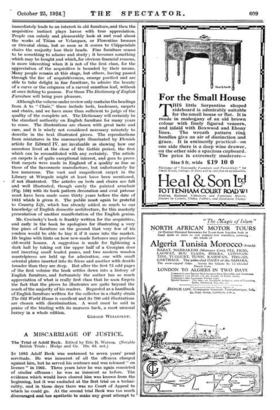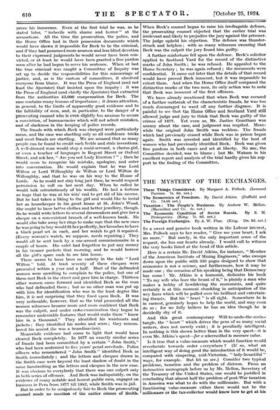• A MISCARRIAGE OF JUSTICE..
IN 1895 Adolf Beck was sentenced to seven years' penal servitude. He was innocent of all the offences charged against him, but he served his sentence and was released "on licence" in 1901. Three years later he was again convicted of similar. offences : he was as innocent as before. The .evidence which would have cleared him was known from the beginning, but it was excluded at the first trial on a techni- cality, and in those days there was no Court of Appeal to which he could go. At the second trial Beck was too much ,diseouraged and,too apathetic to make any great attempt to prove his innocence. Even at the first trial he was, as he stated later, "imbecile with shame and horror" at the accusations. All the time the prosecution, the police, and the Home Office had in their possession documents which would have shown it impossible for Beck to be the criminal, and if they had possessed more acumen and less blind devotion to their expressed judgments he would never have been con- victed, or at least he would have been granted a free pardon soon after he had begun to serve his sentence. When at last the true criminal was caught a Committee of Inquiry was set up to decide the responsibilities for this miscarriage of justice, and, as is the custom of committees, it absolved everyone from blame. It was the Press of England (and not least the Spectator) that insisted upon the inquiry : it was the Press of England (and chiefly the Spectator) that extracted from the authorities 25,000 compensation for Beck. The case contains many lessons of importance ; it draws attention, in general, to the limits of apparently good evidence and to the fallibility of men, and, in particular, to the danger of a prosecuting counsel who is even slightly too anxious to secure a conviction, of bureaucracies which will not admit mistakes, and of slackness in the keeping of police records.
The frauds with which Beck was charged were particularly mean, and the case was startling only as all confidence tricks and most frauds are startling. We are amazed that so many people can be found to credit such feeble and stale inventions. A well-dressed man would stop a maid-servant, a chorus girl. or even a teacher of languages in Regent Street or Oxford Street, and ask her, "Are you not Lady Everton " ; then he would seem to recognize his mistake, apologize, and enter into conversation. He would explain that he was Lord Wilton or Lord Willoughby de Wilton or Lord Wilton de Willoughby, and that he was on his way to the House of Lords. As he could not stay long just then, he would request permission to call on her next day. When he called he would talk ostentatiously of his wealth. He had a fortune so huge that he was at his wits' end to get rid of his mcome. But he had taken a liking to the girl and would like to instal her as housekeeper in his great house at St. John's Wood. She ought to have better clothes and better jewellery, though. So he would write letters to several dressmakers and give her a cheque on a non-existent branch of a well-known bank. He would also take away her rings to make sure that the new ones he was going to buy would fit her perfectly, her brooches to have a black pearl set in each, and her watch to get it repaired. (Every woman's watch, we suppose, needs repairing.) They would all be sent back by a one-armed commissionaire in a couple of hours. His valet had forgotten to put any money in his trouser pockets that morning, and he would borrow all the girl's spare cash to see him home.
There seems to have been no variety in the tale "Lord Wilton" told. At least seventy of these cheques were presented within a year and a half. Most of the defrauded women were unwilling to complain to the police, but one of them met Beck in the street and gave him in charge. Thirteen other women came forward and identified Beck as the man who had defrauded them ; but as no other man was put up with him for identification who was in the least degree like him, it is not surprising that they fixed upon Beck. It was very noticeable, however, that as the trial proceeded all the women witnesses became more and more confident that Beck was the culprit, and under cross-examination they began to remember undeniable features that would make them "know him in a thousand." They identified his waistcoats and jackets ; they identified his moles and scars ; they remem- bered his accent (he was a Scandinavian).
Meanwhile evidence had come to light that would have cleared Beck completely. In 1877 an exactly similar series of frauds had been committed by a certain "John Smith," who had been sentenced to five years' penal servitude. Police officers who remembered "John Smith" identified Beck as Smith immediately ; and the letters and cheques drawn in the Smith case were beyond the least shadow of doubt in the same handwriting as the letters and cheques in the new case.
It was obvious to everybody that there was one culprit only in both series of offences. And Beck was indisputably, on the evidence of many notable and honest public men, engaged on business in Peru from 1177 till 1882, while Smith was in jail.
But in order to be scrupulously fair to Beck the prosecuting counsel made no mention of the earlier crimes of Smith.
When Beck's counsel began to raise his irrefragable defence, the prosecuting counsel objected that the earlier trial was irrelevant and likely to prejudice the jury against the prisoner. The judge upheld his objection. The defence was thunder- struck and helpless ; with so many witnesses swearing that Beck was the culprit the jury found him guilty.
A further misfortune fell upon the defence. Beck's solicitor applied to Scotland Yard for the record of the distinctive marks of John Smith ; he was refused. He appealed to the Home Secretary ; he was again refused ; the documents were confidential. It came out later that the details of that record would have proved Beck innocent, but it was impossible to extort them. And when the Home Office itself compared the distinctive marks of the two men, its only action was to note that Beck was innocent of the first offences.
We have already mentioned that when Beck was accused of a further outbreak of the characteristic frauds, he was too much discouraged to ward off any further disgrace. It is painful to see that the Home Office and Scotland Yard still allowed judge and jury to think that Beck was guilty of the crimes of 1877. Yet even so, Mr. Justice Grantham was uneasy about the case, and judgment was respited. Mean- while the original John Smith was reckless. The frauds which had previously ceased while Beck was in prison began again. Smith was arrested and identified by the host of women who had previously identified Beck. Beck was given free pardons in both cases and set at liberty. No one, the Committee decided, was to blame ; but Mr. Watson in his excellent report and analysis of the trial hardly gives his sup port to the finding of the Committee.



























































 Previous page
Previous page